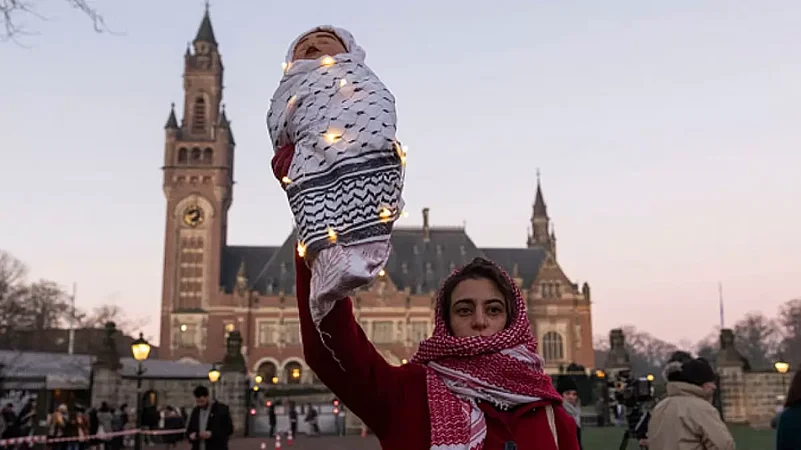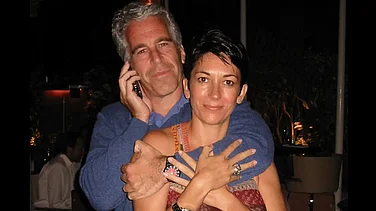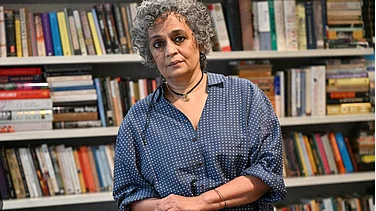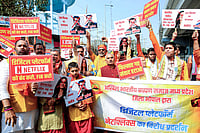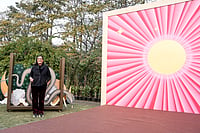The International Court of Justice (ICJ) on Thursday commenced the highly-anticipated hearing on South Africa’s case against Israel that it is committing genocide in its war against Gaza that began on October 7. The two-day hearing is in line with scores of Palestinians and pro-Palestine campaigners around the world who have been seeking a ceasefire and hoping the ICJ proceedings might halt Israel’s devastating occupation in Gaza, which has seen more than 23,000 deaths, including nearly 10,000 children.
South Africa, which presented its arguments on day one of the hearing, had filed the lawsuit against Israel at the ICJ in December calling for an immediate ceasefire to prevent the killing of innocent Palestinians, especially children, in Gaza. In its appeal, the South African legal team accused Israel of committing the offence in violation of the 1948 Genocide Convention, which both countries are party to. While the United Nation’s legal body adjourned the hearing till tomorrow when it will hear Israel’s arguments, here's what happened today.
Flow of Proceedings
Kicking off the proceedings in Hague, Joan Donoghue, president of the ICJ, introduced South African Judge Dikgang Ernest Moseneke and Israeli Judge Aharon Barak, who have taken oaths as ad hoc judges for this case. This was followed by the registrar reading out points raised by South Africa. The nine points included that Israel should immediately suspend its military operations in Gaza, with a reminder that more than 23,000 Palestinians have been killed and almost 60,000 wounded by Israeli attacks since October 7. Vusimuzi Madonsela, the South African ambassador to Netherlands, Ronald Lamola, South Africa’s justice minister, Adila Hassim, Tembeka Ngcukaitobi and other advocates who were representing South Africa’s case presented their arguments on the first day of the hearing alongside Donoghue’s opening remarks. The President of the ICJ spoke about the allegations made by South Africa in its application against Israel under the Genocide Convention- where she quoted parts from South Africa's statement which talks about Israeli actions after October 7 being "genocidal in character" and that Israel "failed to prevent genocide and is committing genocide." She said South Africa also claims Israel violates "other fundamental obligations under the Genocide Convention."
What South Africa Had to Say
Madonsela began with his remarks introducing South Africa and global community’s concerns regarding the ongoing Israel attacks on Gaza. “South Africa has recognised the ongoing Nakba of the Palestinian people through Israel’s colonisation since 1948.” He further added that South Africa acknowledges that the genocidal acts and permissions by the State of Israel inevitably form a part of the illegal acts perpetrated against the people of Palestinian since 1948. “The application places Israel’s genocidal acts and omissions within the broader context of Israel 75-year apartheid, 56-year occupation and 16-year siege imposed on the Gaza Strip,” he mentioned at the ICJ.
Justice Minister Lamola in his statement invoked the spirit of Nelson Mandela, and how that pushed South Africa’s to accede to the Convention on the Prevention and Punishment of the Crime of Genocide in 1998. “This is the spirit in which we approach this court as a contracting party to the convention. This is a commitment to all, to the people of Palestine and Israelis alike.”
'Mass Killing of Palestinians in Gaza'
Adila Hassim, the first advocate to present arguments at the ICJ, pressed on how South Africa argues that Israel has transgressed Article 2 of the convention by committing actions that fall within the definition of genocide. Hassim talked about the genocidal act which was essentially Israel’s “mass killing of Palestinians in Gaza” while showing photos of mass graves where bodies were left unidentified.
“Israel deployed 6,000 bombs per week. At least 200 times, it has deployed 2,000-pound (907kg) bombs in southern Gaza, which it designated safe,” she added. Israel’s infliction of serious bodily or mental harm to Palestinians in Gaza is in violation of Article 2B of the Genocide Convention. Her statements presented the facts that Israel’s attacks have left close to 60,000 Palestinians wounded where the majority of them have been women and children, with the healthcare system having completely collapsed.
Ngcukaitobi’s points further built on the premise of South Africa’s lawsuit against Israel’s action where he pointed out that the genocidal intent against the Palestinians in Gaza is evident from the conduction of Israel’s military attack and how there is a clear pattern of conducting the targeting of family homes and civilian infrastructure. Talking about how Israel PM Benjamin Netanyahu publicly used a Biblical allegory to urge his troops to march into Gaza, he said “The genocidal invocation to Amalek was anything but idle. It was repeated by Mr Netanyahu in a letter to the Israeli armed forces on November 3, 2023.”
'Irreparable Prejudice'
Professor John Dugard, a lawyer, who took on the question of jurisdiction and communication between the parties said that South Africa had sought a meeting with Israel. “To accuse a state of committing acts of genocide and to condemn it in such strong language is a major act,” he said and further mentioned that South Africa had tried to reach the Israeli government via the embassy before filing the case.
The other advocates also presented their arguments following Dugard, emphasising the massive bloodbath that continues in Gaza. “The UN secretary-general and its officials describe the situation in Gaza as ‘a crisis of humanity’, ‘a living hell’, ‘a bloodbath’, ‘a situation of utter deepening and unmatched horror where an entire population is besieged and under attack, denied access to the essentials for survival on a massive scale,” lawyer Blinne Ni Ghralaigh pointed out in her arguments in addition to bringing the massive humanitarian crisis and health disaster to the notice of the court.
The lawyers harped on the urgent need for provisional measures “to protect Palestinians in Gaza from the irreparable prejudice caused by Israel’s violation of the Genocide Convention”.
Israel and Hamas Respond
The spokesperson for Israel's Foreign Ministry said that "Thursday's trial was one of the greatest shows of hypocrisy in history, compounded by a series of false and baseless claims." In a strongly-worded official statement released on X, Israel claimed that "South Africa was functioning as the legal arm of Hamas," and "utterly distorted the reality in Gaza," ignoring the "fact that Hamas terrorists infiltrated Israel, murdered, executed, massacred, raped and abducted Israeli citizens, simply because they were Israelis, in an attempt to carry out genocide." The spokesperson further claimed that South Africa "seeks to allow Hamas to return to commit the war crimes, crimes against humanity and sexual crimes," and that South Africa's lawyers "ignoring the fact that Hamas uses the civilian population in Gaza as human shields."
Hamas offcials responded to the hearing as well. “We welcome the convening of the case on the accusation of ethnic cleansing and genocide,” Basem Naim said. “We are looking forward to seeing a decision by the court that would achieve justice for thevictims, end the aggression on Gaza, and hold the war criminals accountable.” Hamas spokesperson Sami Abu Zuhri said: “The Palestinian people are following the court session in The Hague with great concern and interest. We urge the court to reject all pressure and take a decision to criminalise the Israeli occupation and stop the aggression on Gaza.”







